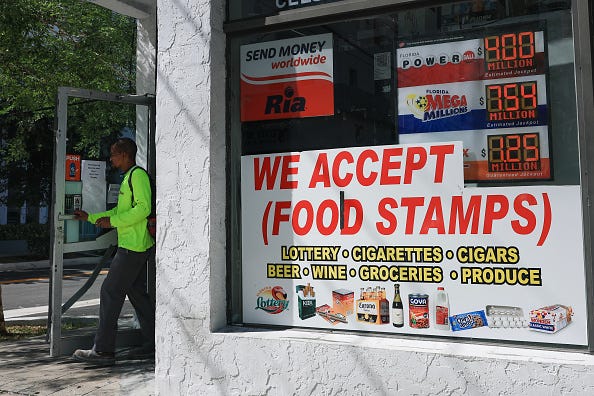
The Confusion Surrounding SNAP Benefits
This weekend has brought a wave of uncertainty for millions of Americans who depend on the Supplemental Nutrition Assistance Program (SNAP) to put food on their tables. As the government shutdown continues, there are growing concerns about the availability of essential food assistance for those in need.
SNAP is a vital anti-hunger program that supports around one in eight Americans each month, with nearly 40% of recipients being children, according to the Johns Hopkins Bloomberg School of Public Health. The program plays a critical role in ensuring that families have access to nutritious food, especially during times of economic hardship.
Government Shutdown Impacts SNAP
The U.S. Department of Agriculture (USDA) recently issued a statement indicating that the "well has run dry" for SNAP benefits due to the ongoing government shutdown. The message stated that no benefits would be issued on November 1, causing alarm among beneficiaries and advocacy groups.
The current impasse between Republicans and Democrats centers on government spending, particularly related to healthcare issues. The administration of former President Donald Trump has placed blame on Democrats, suggesting that they are holding out for policies that include healthcare for undocumented immigrants and gender-related procedures.
In a statement, the USDA highlighted the tension, saying, “They can continue to hold out for healthcare for illegal aliens and gender mutilation procedures or reopen the government so mothers, babies, and the most vulnerable among us can receive critical nutrition assistance.”
Legal Challenges and Court Rulings
In response to the announcement, 26 state attorneys general filed a lawsuit against the USDA, arguing that the agency has access to billions of dollars in a congressionally appropriated contingency fund meant to keep SNAP running during funding lapses. On Friday, U.S. District Judge John McConnell ruled that the federal government must use these contingency funds to maintain SNAP benefits.
The court found that the administration's decision to suspend SNAP benefits for November was likely unlawful and ordered the administration to report back by Monday on its plans to use the contingency funding. However, the court did not formally grant a temporary restraining order sought by the states, instead directing the federal government to take immediate steps to deploy the funds.
Despite this ruling, Secretary of Agriculture Brook Rollins claimed that Democrats are spreading false information about USDA contingency funds. She stated, “There is a contingency fund at USDA, but it doesn’t even cover half of the $9.2 billion that would be required for November SNAP.” Rollins added that the fund is only allowed to flow if the underlying program is funded.
Political Tensions and Calls for Action
Former President Donald Trump also weighed in on the issue, stating that his legal team believes the government does not have the authority to pay SNAP benefits using certain available funds. He noted that two courts have issued conflicting opinions on what the government can and cannot do.
Trump emphasized that he does not want Americans to go hungry due to the actions of the Democratic Party, urging them to "reopen the government." He directed his legal team to seek clarification from the court on how to legally fund SNAP as soon as possible.
He continued to criticize Democrats for the ongoing shutdown, even including Senate Minority Leader Chuck Schumer’s phone number in his post. Saturday marked one month since the shutdown began, with millions of SNAP beneficiaries left worried about their food security.
State Efforts and Future Outlook
Many states are working to provide resources to those impacted by the shutdown, including New Jersey, Pennsylvania, and Illinois. These states are also waiting for updates on the court's ruling that the federal government must fund SNAP.
In a recent statement, the Minnesota Department of Children, Youth and Families said, “Based on a federal court ruling on Oct. 31, we expect we will be able to provide at least partial SNAP and MFIP food benefits in November.” However, they noted that the funds have not been released yet, and the exact amount available remains unclear.
As the situation unfolds, the focus remains on finding a resolution that ensures food assistance for those who rely on it the most. With ongoing negotiations between political parties, the future of SNAP benefits remains uncertain, leaving many families in a state of anxiety and uncertainty.

Post a Comment